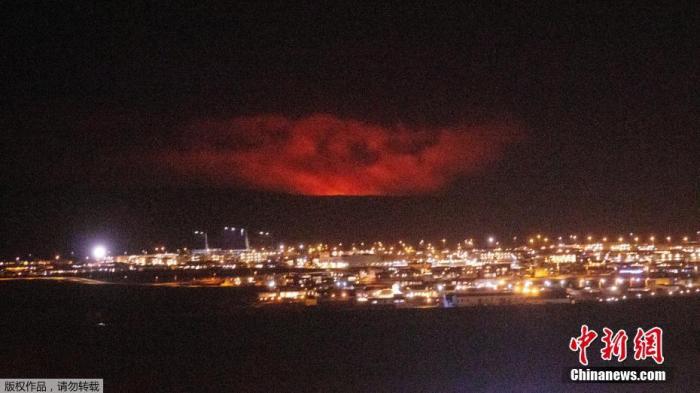China News Service, March 21. According to a comprehensive report, a volcano near Reykjavík, the capital of Iceland, continued to erupt red magma. The volcano had been dormant for about 6,000 years.
Experts said on the 20th that the volcanic eruption seems to have stalled and will not pose a danger to the people.
On March 20, local time, near the Reykjanes Peninsula in southwestern Iceland, the Geldingda Garrsgos Volcano on the Fagradal Mountains continued to erupt, and two streams of lava flowed from both sides of the crater.
In the Reykjanes peninsula in southwestern Iceland, large amounts of red magma flowed out of cracks in the valley near Fagradal Mountain.
Due to heavy rain on the 20th, the lava flow slowed down, and the volcano spewed out blue smoke and vapor clouds.
According to reports, the site of the volcanic eruption is not far from the popular scenic spot Blue Lake, only 40 kilometers away from Reykjavik.
On March 19, local time, about 50 kilometers west of Reykjavík, the capital of Iceland, the Fagradal Mountain volcano erupted, a large amount of lava flowed out, and a layer of red light illuminated the night sky.
According to the Associated Press, the volcano has been dormant for 6000 years, and the Reykjanes Peninsula has not erupted for 781 years.
The eruption occurred at about 20:45 on the 19th local time. Hundreds of small earthquakes occurred in the area, and the night sky was lit up with red light.
Although the Kiflavik International Airport and Grindavik Fishing Port are only a few kilometers away from the volcanic eruption site, there is no one inhabited in this area and it will not pose a danger to the people.
The Icelandic Meteorological Agency, which monitors seismic activity, said in a statement on the 20th: “The current eruption is small and the volcanic activity has slowed down yesterday evening.” International Maritime Organization Earthquake Disaster Coordinator Christine Joensdottir said: The eruption is likely to last for a few days."
According to Agence France-Presse, Iceland currently has 32 active volcanic systems, with an average of one volcanic eruption every five years.

